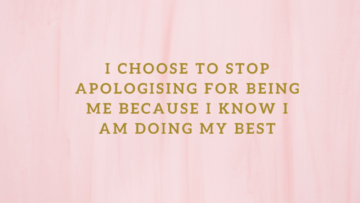
The real meaning of this saying –Investing in yourself is the best investment you’ll ever make. It will not only improve your life, it will improve the lives of all those around you – Robin Sharma became apparent to me when I learnt that investing time and energy to improve myself was also not only for my benefit.
Understanding my value as a person has been pivotal in my journey of self-improvement and most importantly rediscovering my self-worth. But what exactly is self-worth, and why is it so important to the concept of personal growth? Self-worth reflects my belief about my own value and worthiness as a human being and in order to want better for yourself you have to see and feel yourself worthy of the things you desire. My self-worth determines the relationship I have with myself and with others, it’s a critical pillar of my psyche that affects my decisions, relationships, and ever-evolving life path.
The more I invest time and energy into self-improvement, the clearer it becomes how this process strengthens my sense of self. Whenever I reflect on experiences and my role in them I am amazed at the growth that I have been through and am still going through. As I learn new skills, adapt to challenges, and overcome obstacles, I’m not only progressing—I’m also reinforcing my confidence and recognition of my innate value.
When I had a poor sense of self I experienced that I was treated badly by others this made me think that there was something wrong with me. But when I changed my perception of myself and began to accept myself exactly as I am, I started experiencing being treated differently.
There have been times when this journey of healing and self-improvement has seemed impossible because the same lesson has been presented over and over again but with every encounter I learn something new about myself. All the struggle and discomfort are worth those tiny aha moments when I no longer get triggered by something that used to affect me or I am able to stick to a goal and see it through.
Before getting a good understanding and appreciation for my personal development, I struggled with the idea of paying for a mentor or a coach because my mindset was – well I can find all the information I need by myself. Yes, I could but those happened to be fragmented and took longer time for me to get what I was looking for. The day I understood that knowledge in itself isn’t power but applied knowledge is power everything changed for me. That was when I sought a mentor to help me navigate the steps and mindset to achieving my goals.
Though some aspects of wanting to improve yourself can be costly, I see self-improvement as an investment in yourself that can’t be priced. I could go out and splurge on material things which will one day lose its value but the knowledge and personal experience I gain from investing in myself is invaluable. Investing in my personal growth has been one of the best things I remember doing for myself because the amount of confidence it has given me to dare to dream bigger, take bigger risks and believe in myself has been a game changer.
Not only on the external but internally, when I set goals, seek knowledge, and step outside my comfort zone, I am effectively putting stock in my potential. This not only leads to achieving milestones in my personal or professional life but also feeds back into my sense of self, enriching it in a virtuous cycle. All of this is because I have believed myself to be worthy of the things I desire and dreams I have.
When I consider examples around me, it’s clear that those who prioritize their self-worth by actively engaging in self-improvement often achieve more and report greater life satisfaction. Their stories demonstrate the tangible benefits of knowing and nurturing one’s value and the remarkable progress it brings forth.

Self-Improvement: The Journey of Personal Evolution
When I talk about personal growth, I’m referring to the broad and ongoing process of self-improvement. This concept covers every aspect of our lives, from professional ambitions to personal relationships, and touches on improving skills, emotional intelligence, and overall well-being.
The benefits of engaging in self-improvement are numerous and can have a profound impact on our mental and emotional health. As you focus on improving yourself, you may notice an increase in self-confidence and a decrease in feelings of anxiety or depression.
Self-improvement activities, whether they’re aimed at learning a new skill, getting in better shape, or simply expanding your knowledge, can lead to a more fulfilled and enriched life. This satisfaction comes from the pursuit of goals that are both challenging and rewarding.
The most important step in initiating a self-improvement journey starts with identifying areas where you wish to grow. This is where we need to draw on our self-awareness so that we can see what needs improvement. Some ways to cultivate this self-awareness could involve setting aside time for meditation to enhance mindfulness, going through a self-assessment worksheet or asking close friends to honestly let you know what they think your strengths and weaknesses are. Then when these are pinpointed you can start the work by enrolling in courses for professional development or cultivating habits that align with your personal values.
Maintaining momentum on this journey requires persistence and resilience. It’s about setting realistic goals, tracking progress, and being patient with yourself as you navigate the twists and turns of self-improvement.
Now let’s explore some of the thoughts behind creating your own personal development plan – a strategic blueprint for your self-improvement goals that reflects your desire for a higher sense of self-worth and personal growth.

Creating Your Personal Development Plan
A personal development plan acts as a strategic roadmap for your self-improvement journey. Think of it as a tailored blueprint that guides you towards enhancing your self-worth and achieving your personal growth aspirations.
The creation of this plan begins with self-reflection. Consider where you currently stand in aspects such as career, personal skills, spirituality and relationships. Pinpoint the areas you most want to develop and set concrete, achievable goals. Doing this will require brutal honesty with yourself because a well-crafted plan accounts for your strengths, weaknesses, opportunities, and threats—a SWOT analysis of your personal life.
In constructing your personal development plan, being specific is very important. Detailed actions, timelines, and success criteria turn vague intentions into actionable steps. For instance, if your goal is to improve public speaking skills, you might detail attending a Toastmasters meeting once a week, practising a speech bi-weekly, and evaluating progress monthly.
Adapting the plan as you go is both expected and beneficial. As your skills grow and your goals evolve, so too should your plan. This reflects the dynamic nature of your personal growth journey.
Commitment is paramount. Determine a regular schedule to review and adjust your plan as needed. This not only helps you stay on track but also allows you to celebrate the milestones you’ve achieved, enhancing your sense of self-worth along the way.
Lastly, tracking your progress is vital in maintaining motivation. Whether through journaling, a digital tracker, or regular self-assessment, monitoring your advancements offers tangible evidence of your self-improvement efforts. These records serve as a motivational reservoir for those times when you face obstacles or need a reminder of how far you’ve come.
In a recent goal to drop a few kilos, I took pictures of my before and after and then wrote down the numbers I saw on the scale alongside this was also the goal number. A month later when I stepped back up on the scale my initial reaction was frustration because I thought nothing had happened but after I pulled out the written numbers I was amazed at the improvement.
This boosted my confidence, my motivation was off the charts and my self-worth increased exponentially. Had I not put together a detailed plan and been tracking I would have been worried that I hadn’t made any improvement. In any activity aimed at self-improvement, it is advisable to have a detailed plan, be committed to seeing it through and being consistent with actions.

The Ripple Effect of Self-Improvement on Society
When we improve ourselves, the benefits don’t stop with us. Personal growth has an undeniable ripple effect that extends to our relationships, our workplace, and even the broader community. As our self-worth grows and we become more skilled, confident, and emotionally intelligent, these traits help us form stronger bonds. Our improved relationship with ourselves and others helps us communicate clearly so that we avoid unnecessary misunderstandings and rather contribute to conflict resolution, making our social circles more harmonious.
This improvement also helps our professional lives as our enhanced capabilities can lead to better job performance, promotions, and a positive work environment. It’s thrilling to see how a commitment to personal development can influence professional achievements, impact colleagues, and contribute to organizational success.
Summing Up
My biggest motivation for wanting to improve myself has always been how I can be the better version of myself to help my little corner of the world. Yes, to be able to help others is on top of my list and just because I believe that when we all do our little bit we make the whole a better place.
I am inspired by countless stories of how individuals are touching others by improving themselves. My late mentor Bob Proctor was such a man who got a chance to improve himself and then decided to share his lessons with others. He is not alone and you might know of others as well, my point is you too can make such an impact on someone by improving your life.
There are many stories out there about how one person’s dedication to self-improvement inspires a friend, a family member, or even an entire community to strive for betterment. This contagious effect is an aspect of personal development that cannot be emphasized enough.
So if you are not sure where to start or why, can I please urge you to consider your journey not just as a desire for your personal fulfilment, but as a vital contribution to the collective wellbeing. As this article comes to an end I hope that your journey to self-improvement will not be an afterthought but a priority for when you improve so does the world around you. I’d love to hear of your experiences or questions so please do share these in the comments.
Love & Light
Sheila Daisy




